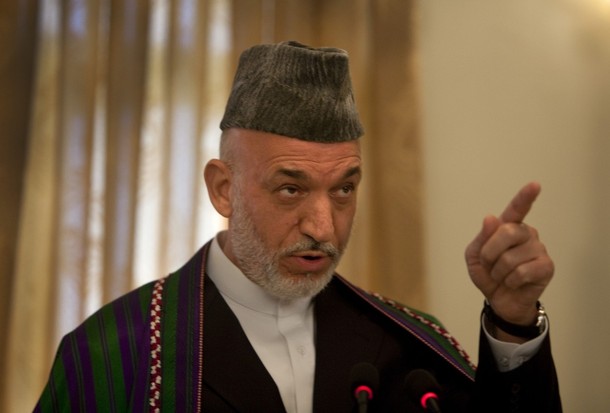Although supporters of the Afghan War (including the Obama administration) hate the comparison, the outcome of the recent runoff election fiasco in Afghanistan suggests a parallel with the American experience in Vietnam.
In 1963, the United States was supp0rting the government of Ngo Dinh Diem. His regime did not enjoy great support in the country, was notoriously corrupt and repressive, and Diem was a master at ignoring American advice about how to improve the situation in the country. Meanwhile, the situation on the ground continued to deteriorate, with South Vietnamese control gradually contracting to control of major cities, while the National Liberation Front/Viet Cong (NLF/VC) and their North Vietnamese allies increasingly controlled the countryside. It was increasingly clear that “our” side was going to lose unless something happened.
That something was the assassination of Diem and his brother Ngo Dinh Nhu in late 1963 as part of a coup. The exact nature of American complicity in this action remains a matter of conjecture that goes beyond present purposes. Suffice it to say that the United States neither acted decisively to prevent what happened nor openly mourned the passing of Diem.
The death of Diem, however, created a critical decision point for the United States that may have its parallel in Afghanistan today. In Vietnam, retrospective (and the ignored advice of a few within and outside government at the time) suggested that the murder of Diem provided the United States to cut its losses in an unwinnable war by simply saying, in effect, “We have done our best here, but they cannot get their act together, so we are leaving.” That path was not taken; instead, the US backed a series of military governments and ultimately lost in Vietnam.
There are clear parallels today. Hamid Karzai is, in many ways, Ngo Dinh Diem. Understanding the frailty of historical comparisons, Karzai’s record is not that much different than Diem’s. In particular, a recent Washington Postarticle by Scott Wilson and Rajiv Chandrasekaran (whose book, Imperial Life in the Emerald City, is my favorite on Iraq), included a depiction of Karzai that entirely befitted Diem, arguing Karzai’s “record raises doubts about his willingness to take the steps necessary to reform his government.” Whether Karzai himself is corrupt or not is beside the point: his regime reeks of corruption. He has promised to root all the corruption out; so did Diem. Diem didn’t mean it; does Karzai?
The United States’s plan for additional forces also harkens back to those dark days of 1963. In recent days, we have been told that the purpose of the forces is to reinforce government control of major cities, leaving the hinterlands (which, of course, is the hotbed of insurgent support) to the Taliban while the government develops its own forces. This emphasis is grotesquely reminiscent of the map of Vietnam in 1963. Things did not work out so well then. Why should they now?
The bottom line of a comparison between 1963 and now is that the bogus election and small melodrama of the cancelled runoff provide the same kind of critical junction that Diem’s death did. The election outcome is an open sham, and everyone knows it. Does this mean there is a chance to ask the same question that was raised and discarded in 1963? Should we (or can we) say, “Hamid, you have had your chance and you’ve blown it. We are leaving, except possibly with some Special Forces to harass and chase down Al Qaeda. Good luck!”
I don’t expect anybody in government seriously to consider this alternative, but is it any worse than what we are doing now?
Donald M. Snow, Professor Emeritus at the University of Alabama, is the author of over 40 books on foreign policy, international relations and national security topics. This essay was originally published at the What After Iraq? blog.
Image: karzai-finger-point.jpg
